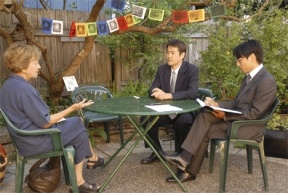LANGLEY — They came to see how American schools work, but two university professors from Japan found something else in South End schools.
Smiles. Plenty of them.
Tetsuo Kuramoto and Tsuyuguchi Kenji visited South Whidbey schools Monday. Kuramoto is studying curriculum instruction and community engagement; Kenji is studying parent relationship management and school administrative employment.
One thing Kuramoto and Kenji have found is that children in schools here appear happy. Kuramoto was pleased that children appeared to enjoy school more.
“Teachers are always smiling and kids seem happier; smiling. Smiling is a key word here. Kids laugh, it’s true,” Kuramoto said.
After their visit, the two guests will prepare a report for the Ministry of Education in Japan about what they’ve learned.
“We got a government fund, so we need to study American schools. We need to write huge reports about how American schools work,” Kuramoto explained.
For the educational experts, who come from universities in southern Japan at Matsuyama and on Kyushu Island, there are similarities between the American and Japanese education systems. It was the differences that inspired them to visit Washington, however.
“Entrance exams are very strict in Japan. You have to study a lot and get good testing scores, like WASLs,” he said.
“But, here, if you want to go to Harvard, for example, you need to get great SAT,” Kuramoto said, as well as participating in sports and the community.
“Education achievement is a very good concept here. We need to learn about that. Humanity and education achievement, these are very important,” he added.
While Kuramoto studies community and the ability of educators to tap into the community, Kenji is just as concerned about how to deal with what he calls “Monster Moms,” mothers of students who do not engage in the education process but hinder it.
They spent nearly an hour at Island Coffee House & Books in Langley speaking with Sue Haworth. Haworth, a retired school principal, helped outline the similarity of parenting issues in both Japan and America.
“He is studying parent relationship management; how do you deal with parents?” said Kuramoto, translating for Kenji.
Both Kuramoto and Kenji appeared surprised when Haworth suggested parent nights, gatherings where parents meet their student’s teachers, or ice cream socials that are held to help break the ice.
“We see perhaps 50 percent of parents coming to visit during events like that,” Haworth said. “And 75 percent of those are the mothers.”
“Fifty percent is a high number,” said Kuramoto.
Haworth appreciated the opportunity to talk with the professors.
“I think the dialogue is really good. It provides growth for all of us,” Haworth said. “It gives me an opportunity to understand their school system and what they are looking for in it — beyond what we might read in the newspapers, magazines or television.”
Susie Richards, director of the Learning and Community Engagement Program, told the visitors their hosts had learned a few things, too.
“I think it is wonderful for us to have the opportunity to learn from you and have that exchange of ideas and information where we can share and talk with people from other communities,” Richards said.
Spencer Webster can be reached at 221-5300 or at swebster@southwhidbeyrecord.com



